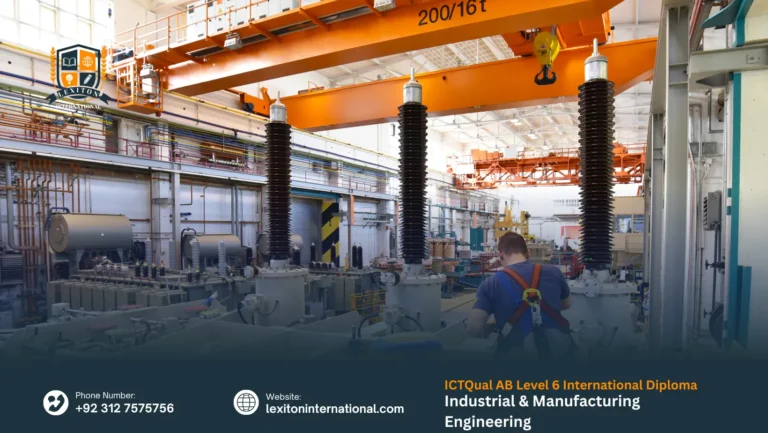The ICTQual AB Level 6 Diploma in Civil Engineering is a comprehensive three-year programme designed for aspiring civil engineers seeking advanced technical and managerial expertise. With a total of 360 credits, this diploma equips learners with in-depth knowledge of structural design, project management, construction technology, and sustainable civil engineering practices.
Participants will gain practical skills in planning, designing, and supervising complex civil engineering projects, ensuring compliance with international standards and safety regulations. The course emphasises real-world applications, including site management, construction supervision, and advanced civil engineering software, preparing graduates to take on leadership roles in the industry.
Ideal for school leavers, recent graduates, and professionals aiming to advance their careers, the Level 6 Diploma provides a strong foundation for managerial and technical roles in civil engineering. Graduates will be ready to work as civil engineers, project managers, site supervisors, or structural engineers, with the option to pursue further studies or professional certifications to enhance their career trajectory.
The ICTQual AB Level 6 Diploma in Civil Engineering is designed for learners who wish to pursue advanced knowledge and professional competence in civil engineering. To ensure participants gain the maximum benefit from this three-year, 360-credit programme, certain academic, professional, and language requirements are recommended.
- Age Requirement: Learners should ideally be 18 years or older, as the course covers advanced civil engineering concepts and professional project management principles.
- Educational Background: Applicants should have a Level 5 qualification or equivalent in civil engineering, construction, or related disciplines.
Candidates with a bachelor’s degree or equivalent in civil, structural, or construction engineering are also eligible. - Work Experience: Relevant industry experience in civil engineering, construction projects, or site management is advantageous but not mandatory. Practical exposure can enhance understanding of course concepts.
- English Language Proficiency: Learners should have a good command of spoken and written English to comprehend technical materials, complete assessments, and communicate effectively in professional settings.
- Professional Interest in Civil Engineering: Participants should have a strong interest in pursuing a career in civil engineering, construction management, or infrastructure development.
- Commitment to Long-Term Study: As this is a three-year programme, candidates should be prepared for a structured learning schedule that combines theoretical knowledge with practical application.
Mandatory Units
This qualification, the ICTQual AB Level 6 Diploma in Civil Engineering 360 Credits – Three Years, consists of 36 mandatory units.
Year 1: Foundation and Core Engineering Concepts
Year 2: Advanced Engineering Topics and Specializations
Year 3: Professional Practice, Innovation, and Capstone Projects
Below are the learning outcomes for each of the study units in the ICTQual Level 6 Diploma in Civil Engineering program:
Year 1: Foundation and Core Engineering Concepts (120 Credits)
Introduction to Civil Engineering
- Understand the scope and significance of civil engineering in infrastructure development.
- Recognize the professional responsibilities and ethical practices in civil engineering.
Mathematics for Engineers
- Apply mathematical techniques to solve engineering problems involving calculus, algebra, and statistics.
- Develop analytical skills for engineering applications.
Engineering Mechanics
- Analyze forces and moments in static and dynamic systems.
- Apply principles of mechanics to solve practical engineering challenges.
Construction Materials
- Understand the properties and uses of common construction materials like concrete, steel, and timber.
- Evaluate material suitability for various construction applications.
Surveying and Measurement
- Conduct accurate land measurements using surveying instruments.
- Interpret survey data for construction planning.
Environmental Science for Engineers
- Understand the environmental impacts of engineering projects.
- Apply sustainable practices in engineering solutions.
Technical Drawing and CAD
- Create precise technical drawings using traditional and computer-aided design (CAD) tools.
- Interpret and produce engineering schematics and blueprints.
Hydraulics and Fluid Mechanics
- Analyze fluid behavior in engineering systems.
- Design basic hydraulic systems for infrastructure projects.
Geology and Soil Mechanics
- Understand geological processes and their impact on construction projects.
- Evaluate soil properties for foundation design.
Health and Safety in Construction
- Identify workplace hazards in construction environments.
- Apply safety standards and protocols to minimize risks.
Construction Methods and Technologies
- Understand modern construction techniques and technologies.
- Evaluate their application in diverse engineering projects.
Communication and Professional Skills
- Develop clear and effective professional communication skills.
- Work collaboratively within multidisciplinary teams.
Year 2: Advanced Engineering Topics and Specializations (120 Credits)
Structural Analysis and Design
- Analyze structural systems for stability and strength.
- Design components like beams, columns, and trusses.
Geotechnical Engineering
- Evaluate soil and rock mechanics for advanced foundation designs.
- Apply geotechnical principles to mitigate site-specific challenges.
Transportation Engineering
- Plan and design roadways and transportation systems.
- Assess traffic flow and implement solutions for improved safety.
Water Resources Engineering
- Design systems for effective water distribution and wastewater management.
- Analyze hydrological data for infrastructure planning.
Building Information Modeling (BIM)
- Utilize BIM software to design and manage construction projects.
- Integrate BIM techniques for project efficiency and collaboration.
Advanced Surveying and GPS Technologies
- Apply GPS technology for precise land surveying and mapping.
- Implement advanced surveying methods in complex projects.
Steel and Concrete Structures
- Design and analyze steel and concrete structures for various applications.
- Evaluate the performance of structural elements under different conditions.
Sustainable Construction Practices
- Implement sustainable methods to reduce environmental impacts.
- Promote energy-efficient construction techniques.
Highway Design and Maintenance
- Design highways and plan maintenance strategies for long-term usability.
- Assess material and technology options for road construction.
Construction Contracts and Law
- Understand legal frameworks governing construction projects.
- Manage contractual obligations and disputes effectively.
Project Planning and Management
- Develop project schedules and resource allocation plans.
- Implement risk management strategies for successful project delivery.
Engineering Economics
- Evaluate economic factors influencing engineering decisions.
- Conduct cost-benefit analyses for infrastructure projects.
Year 3: Professional Practice, Innovation, and Capstone Projects (120 Credits)
Professional Ethics and Responsibilities in Civil Engineering
- Understand ethical principles and professional responsibilities.
- Apply ethical decision-making in project execution.
Advanced Structural Engineering Applications
- Design and assess advanced structural systems like high-rises and bridges.
- Utilize cutting-edge tools for structural analysis.
Bridge Design and Construction Management
- Plan and execute bridge designs considering functional and aesthetic aspects.
- Manage bridge construction processes efficiently.
Foundation Engineering for Complex Projects
- Design foundations for complex structures like skyscrapers and offshore platforms.
- Address geotechnical challenges using innovative solutions.
Urban Infrastructure Planning and Development
- Plan sustainable urban infrastructure, including utilities and transport systems.
- Assess the impact of urban development on communities and ecosystems.
Earthquake-Resistant Structural Design
- Design structures to withstand seismic activities.
- Apply international standards for earthquake resilience.
Construction Site Management and Supervision
- Oversee construction site operations for efficiency and safety.
- Manage on-site teams to achieve project milestones.
Environmental Impact Assessment for Civil Projects
- Conduct environmental assessments for large-scale civil projects.
- Implement mitigation strategies to minimize environmental damage.
Risk Assessment and Mitigation in Construction Projects
- Identify potential risks in construction projects.
- Develop and apply mitigation strategies for project continuity.
Entrepreneurship and Leadership in Civil Engineering
- Cultivate leadership skills for managing engineering firms.
- Explore entrepreneurial opportunities in civil engineering.
Smart Cities and Sustainable Infrastructure
- Integrate smart technologies into infrastructure planning.
- Promote sustainability through innovative urban solutions.
Capstone Project (Professional Practice)
- Apply learned concepts to design and execute a comprehensive civil engineering project.
- Demonstrate problem-solving, innovation, and professional skills in real-world applications.
The ICTQual AB Level 6 Diploma in Civil Engineering is ideal for learners seeking advanced knowledge in civil engineering, construction management, and infrastructure development. The programme prepares candidates for leadership, technical, and supervisory roles in the civil engineering industry.
Aspiring Civil Engineers
- Individuals aiming to start a professional career in civil engineering.
- Graduates seeking advanced technical knowledge in structural design and construction practices.
- Learners looking to specialise in project management, construction supervision, or structural analysis.
- Professionals preparing for leadership roles in civil engineering projects.
- Individuals interested in sustainable and modern civil engineering practices.
- Learners aiming to develop practical skills for real-world construction and infrastructure projects.
- Candidates seeking internationally recognised qualifications for career advancement.
Project Managers and Site Supervisors
- Construction professionals seeking formal certification in civil engineering management.
- Site supervisors aiming to enhance their knowledge of project planning and resource management.
- Professionals responsible for overseeing complex construction projects and ensuring compliance.
- Individuals seeking to strengthen leadership and decision-making skills on-site.
- Candidates wanting to implement best practices in safety, quality, and cost control.
- Supervisors preparing for higher managerial or operational responsibilities.
- Professionals aiming to improve project efficiency and team management.
Recent Graduates in Engineering
- Graduates with bachelor’s or equivalent degrees in civil, structural, or construction engineering.
- Young professionals seeking structured, advanced-level training in civil engineering principles.
- Learners aiming to gain practical knowledge alongside theoretical expertise.
- Graduates looking to enhance employability in competitive construction and infrastructure sectors.
- Individuals preparing for entry into technical or managerial roles.
- Candidates seeking professional recognition and career growth opportunities.
- Graduates interested in both domestic and international civil engineering careers.
Industry Practitioners and Technical Staff
- Experienced engineers and technicians working in construction, infrastructure, or civil projects.
- Professionals looking to transition into higher-level management roles.
- Staff aiming to improve technical knowledge in construction materials, structural design, and surveying.
- Engineers seeking to strengthen project management and operational skills.
- Technical staff wanting to gain a globally recognised civil engineering qualification.
- Practitioners preparing to lead teams and supervise complex engineering projects.
- Individuals interested in enhancing career stability and long-term professional growth.
Career Changers Entering Civil Engineering
- Professionals from related engineering or construction sectors seeking to shift into civil engineering.
- Candidates looking for high-demand career opportunities in infrastructure development.
- Individuals aiming to gain formal recognition for their skills and experience.
- Workers seeking to move into supervisory, technical, or managerial positions.
- Career changers preparing for advanced project roles or consultancy work.
- Professionals targeting leadership positions in civil engineering organisations.
- Candidates motivated to combine practical experience with formal qualifications.
Organisations and Employers Upskilling Staff
- Companies aiming to train staff in advanced civil engineering practices.
- Employers seeking certified employees for project management and site supervision roles.
- Construction and engineering firms looking to standardise operational and technical practices.
- Organisations preparing for regulatory audits, safety compliance, and quality assurance.
- Firms aiming to improve workforce productivity and project efficiency.
- Employers committed to developing future leaders in civil engineering.
- Companies looking to enhance reputation through certified and skilled personnel.
Professionals Seeking International Opportunities
- Engineers and project managers targeting global infrastructure projects.
- Professionals aiming to work in regions with high civil engineering standards.
- Candidates seeking internationally recognised certification to improve employability abroad.
- Individuals preparing for overseas assignments or multinational construction projects.
- Engineers aiming to gain exposure to global construction practices and standards.
- Professionals looking to advance in international civil engineering markets.
- Learners seeking mobility and career growth in global engineering sectors.
Completing the ICTQual AB Level 6 Diploma in Civil Engineering equips learners with advanced technical knowledge, practical skills, and professional credibility. Graduates are prepared for managerial, supervisory, and specialised roles in civil engineering, construction, and infrastructure development, both locally and internationally.
Career Advancement in Civil Engineering
- Graduates can secure roles as Civil Engineers, Structural Engineers, Site Supervisors, or Project Managers.
- Prepares learners for senior positions overseeing construction projects and infrastructure development.
- Enhances employability in both private and government engineering organisations.
- Provides skills to manage teams, budgets, and project timelines effectively.
- Equips professionals to implement safety standards, quality control, and compliance regulations.
- Strengthens credibility with employers seeking qualified, certified civil engineers.
- Builds a foundation for long-term career growth in infrastructure and construction management.
Progression to Higher-Level Engineering Qualifications
- Graduates can advance to Level 7 Diplomas or Advanced Civil Engineering Certifications.
- Enables learners to specialise in structural design, project management, or construction technology.
- Supports entry into leadership roles or advanced technical positions in engineering firms.
- Provides opportunities to pursue professional development courses in construction and infrastructure.
- Enhances knowledge in advanced surveying, geotechnical engineering, and sustainable practices.
- Prepares learners for complex project planning and risk management responsibilities.
- Equips professionals for advanced studies in civil, structural, or construction engineering.
International Employment Opportunities
- Graduates gain recognition for international civil engineering projects and multinational companies.
- Enhances employability in regions such as the Middle East, Europe, Asia, and North America.
- Prepares candidates to work on large-scale infrastructure, industrial, and urban development projects.
- Provides the credentials needed to meet international standards in project management and construction.
- Supports opportunities in offshore projects, consultancy, and global engineering firms.
- Equips professionals with skills to handle multi-cultural teams and international engineering standards.
- Strengthens long-term career mobility and global employability.
Leadership and Supervisory Pathways
- Learners can progress to Site Manager, Project Supervisor, or Department Head roles.
- Equips professionals to lead teams on construction sites and manage complex civil projects.
- Develops skills in operational decision-making, resource allocation, and project coordination.
- Provides knowledge to implement project safety, quality, and compliance standards.
- Prepares graduates to mentor junior engineers and technical staff.
- Builds capability for strategic planning and risk management on-site.
- Opens pathways to executive positions in engineering organisations and construction companies.
Entrepreneurial and Consultancy Opportunities
- Graduates can establish their own construction, consultancy, or engineering firms.
- Provides practical knowledge in project planning, operational management, and technical supervision.
- Equips learners to advise clients on civil engineering design, risk mitigation, and sustainability.
- Supports entrepreneurial growth in civil engineering, infrastructure, and project management sectors.
- Strengthens skills in budgeting, resource management, and regulatory compliance.
- Enables professionals to implement innovative solutions in construction projects.
- Prepares learners for consultancy roles offering strategic engineering solutions.
Organisational Impact and Workforce Development
- Employers gain qualified staff capable of managing projects efficiently and safely.
- Enhances organisational productivity, reduces errors, and improves project completion rates.
- Strengthens workforce technical knowledge and leadership capabilities.
- Ensures compliance with safety, quality, and international engineering standards.
- Supports talent development and succession planning within engineering firms.
- Improves company reputation by employing certified and skilled civil engineers.
- Contributes to innovation and efficiency in large-scale civil and infrastructure projects.
Curious About This Course?







